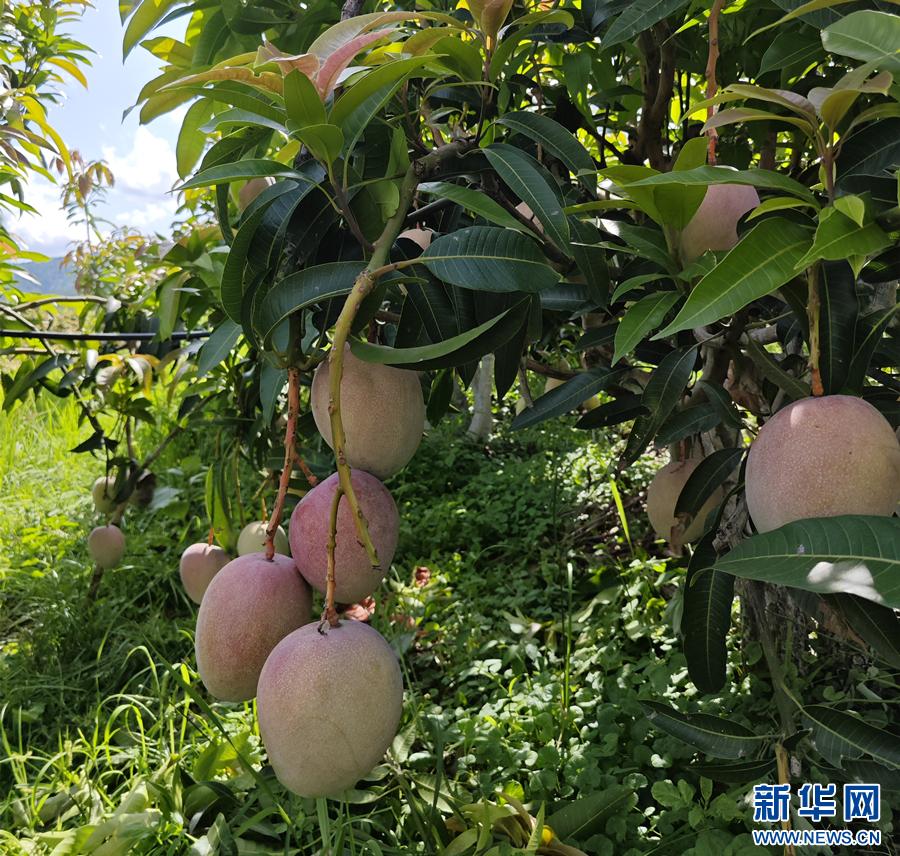Southwest China's Yunnan Province has vigorously developed its mango planting industry in its dry and hot valleys, where mountain slopes once suffered from soil and water erosion, based on local conditions in recent years.
Once barren slopes are now filled with mango trees in Lanping Bai and Pumi Autonomous County, in Nujiang Lisu Autonomous Prefecture.
The landscape has changed a lot since the county launched a program to relocate people from inhospitable areas, aiming to improve their living environment.
Given the ecological fragility of the dry, hot valley, Zhang Haiqiu, deputy director of the county's bureau of agriculture and rural affairs, suggested establishing a modern agricultural industrial park to integrate the ecology and development, and improve people’s living standards.

Photo taken on July 24, 2023 shows mangoes on the tree in an orchard in Huaping county, Yunnan Province. (Xinhua/He Runxian)
In 2019, the county introduced a company to build a mango planting base covering 5,000 mu, or about 333.3 hectares.
"The valleys are suitable for growing tropical fruits. Mango trees are drought-resistant and deliver good economic returns, which can increase people's incomes while protecting the ecology," said Li Yongping of the Yunnan Green Food Development Center.
Thanks to the planting base, farmers receive wages, land rental income, and dividends. “Now, I receive a monthly salary of 4,500 yuan ($614), and my annual income reached nearly 70,000 yuan," said Chu Xiaochang, a local farmer who works in the planting base.
Yunnan's vast yet scattered dry and hot regions feature a fragile ecology and are now full of vitality. In 2022, the province's mango plantation area reached 1.84 million mu, ranking first nationwide. The tropical fruit planting industry represented by mango cultivation led to the better use of land in the dry and hot valleys.
"Yunnan has the longest mango supply period, which lasts from mid-May to early December, in China," said Li, adding that four types of mangoes, including early-season mangoes, in the province reach the market at the proper time, ensuring the stable supply of the fruit.
In Yuanjiang Hani, Yi and Dai Autonomous County of Yuxi city, Su Yongren, head of a fruit cooperative, took the lead in grafting early-season mango trees to make them suitable for dry and hot valleys.
After three years of efforts, early-season mangoes hit the market in May. As mangoes in other places of China are not yet commercially available during the period from early May to late June, Yuanjiang's early-season mangoes are in high demand.
"The price of our early-season mangoes can reach up to 30 yuan per kilogram, compared to 4 yuan per kilogram for other varieties," Su said, adding that the county's mangoes are sold to northwest China's Xinjiang Uygur Autonomous Region and northeast China.
Driven by good market feedback, an increasing number of mango growers in the county have taken the initiative to plant early-season mangoes.
Today, the county is home to nearly 240,000 mu of mango plantations, with annual output reaching 230,000 tonnes, and annual output value approaching 1.2 billion yuan.
Mango germplasm resources are the key to the development of the mango industry, said Guo Xuehong, director of the organic and late-season mango research center of Huaping county in Lijiang city.
Huaping county has established a mango germplasm repository. Guo has led a team to collect 330 mango germplasm resources from home and abroad, and plant over 3,000 mango trees of various varieties, making the repository one of the mango germplasm repositories with the largest number of varieties in China.
Having engaged in the mango planting industry for 30 years, Guo has witnessed the growth of the sector in Huaping. "Before 2017, the planting area of mango trees in the county was less than 200,000 mu, compared to over 400,000 mu now," Guo said.
In Huaping county, 80,000 people are engaged in the green industry centered around mangoes, with an average household income of 186,000 yuan.
Over the past more than 20 years, the Institute of Tropical and Subtropical Cash Crops at the Yunnan Academy of Agricultural Sciences has preserved over 1,000 mango germplasm resources from home and abroad, laying a sound foundation for mango cultivation in the province.
Category
China's Yunnan Develops Mango Planting Industry According to Local Conditions
Contributor
China's Yunnan Develops Mango Planting Industry According to Local Conditions
Country
Case Study

